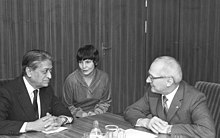Romesh Chandra

Romesh Chandra (born March 30, 1919 in Lyallpur , † July 5, 2016 in Mumbai ) was an Indian journalist , politician and President of the World Peace Council .
Life
Chandra was the son of Ram Chandra and Nila née Swift. He studied politics and history in Lahore and Cambridge and graduated with a BA with honors . He took part in the struggle for national independence from India and spent a number of years in prisons under the British colonial power .
In 1942 he was elected General Secretary of the All-Indian Student Union, from 1951 he was a member of the Central Committee (ZK) of the CP of India , and since 1985 its Politburo . In 1952 he became general secretary of the All-India Peace Committee , which met in Jalandhar in 1952, in Madras in 1954 and in Bangalore in 1957. Since 1963 Chandra was a member of the Presidium of the World Peace Council (WFR) , from 1966 to 1977 as its Secretary General and since 1977 as President. In 1990 he was elected honorary president.
Through his work in the World Peace Council and the associated travel and lecture activities, the countless discussions and consultations with high-ranking government representatives from all continents, he has given the World Peace Council consultative status at the United Nations (UNO), which has since been a non-governmental organization (NGO ) is established. He also became Vice-President of the Conference of NGOs with Advisory Status at the United Nations; Vice-President of the NGO Special Committee on Disarmament and Chairman of the NGO Sub-Committee against Racism , Racial Discrimination and Apartheid , member of the bureau (boards) of the NGO's special committees on development and human rights ; Representative of the NGO Special Sub-Committee of the North-South Commission and Chairman of the NGO Committee for Development (United Nations, Vienna ). He also established relationships with similar international organizations such as the International World Council of Women for Peace .
However, in spite of partial progress in peace and disarmament steps in certain regions of the world, Chandra felt the importance of the WFR declined in the 1970s. Looking back on 1981, Chandra regretted that the "peace movement, despite its unprecedented vigor and mass participation, is not yet strong enough" to achieve its goal.
During the Cold War , he was one of the politicians hostile to the West who were seen as “Moscow puppets”. The women's rights activist Aline Boccardo writes:
“We also received publications from the Eastern Bloc through the UN contacts in Geneva. These were, for example, reports on a World Congress for Peace, texts by Romesh Chandra […]. Romesh Chandra as President of the World Peace Council had long since been defamed as the 'red devil' with the worst slander. I met him several times at the UN and could only ever see him as a quiet, kind man who also exuded something of the meditative attitude of his home country India. [...] Basically, it was a lesson to me how images of the enemy are inoculated: 'I don't know him, but that's a very bad guy ...' "
Romesh Chandra was married to Perin Bharucha.
Publications (selection)
- World Assembly of Builders of Peace . Published by the World Peace Council Information Center, Helsinki (Finland), 1977
- In the fight for peace in the world (interview). In: Einheit, Berlin 34 (1979), pp. 839-844
- The voice of the masses on the scales of history. For the International Year of Peace
Honors
- International Lenin Peace Prize 1968
- Honorary Citizen of Wroclaw 1979
literature
- Aline Boccardo: Women for Peace: a life story . Paulusverlag Freiburg (Switzerland), 2003, ISBN 3-7228-0591-0 .
Individual evidence
- ^ Veteran Communist Leader and Freedom Fighter Romesh Chandra Passes Away . The Wire, July 5, 2016 (English).
- ↑ Romesh Chandra . International Progress Organization, accessed July 5, 2016.
- ↑ Aline Boccardo: Women for Peace: A Life Report . Paulusverlag, Freiburg (Switzerland) 2003, ISBN 3-7228-0591-0 , p. 251.
| personal data | |
|---|---|
| SURNAME | Chandra, Romesh |
| BRIEF DESCRIPTION | Indian politician and peace activist |
| DATE OF BIRTH | March 30, 1919 |
| PLACE OF BIRTH | Lyallpur (India) |
| DATE OF DEATH | 5th july 2016 |
| Place of death | Mumbai |